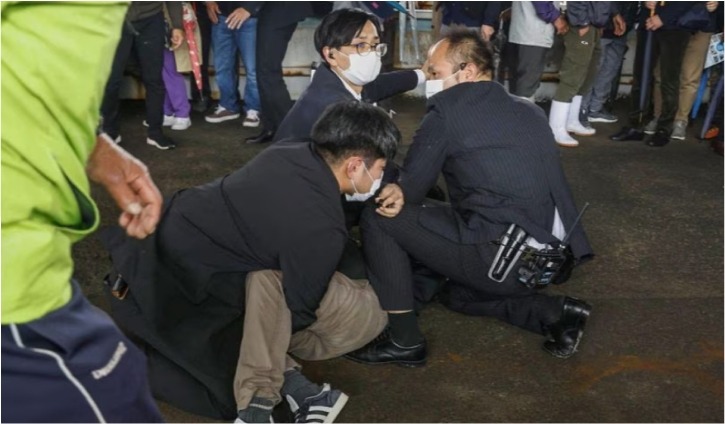
Japanese Prime Minister Fumio Kishida escaped unharmed after a suspect threw a metal cylinder that appeared to be a smoke bomb at an outdoor speech in western Japan on Saturday. The incident occurred at the Saikazaki fishing harbour in Wakayama prefecture, where Kishida was being served local seafood before the explosion, according to media reports. Although there was a loud explosion, the premier took cover and was unharmed while the police subdued the man at the scene. No injuries were reported.
The suspect was identified as a 24-year old male from Kawanishi city and was arrested by the police. A woman at the scene reported seeing an object flying overhead and stated that it made her daughter cry. Police are investigating the details of the incident.
Kishida resumed his campaign speeches, apologising for causing concern and stressing the importance of continuing the election campaign together. By-elections for the lower house of Japan’s parliament will be held on April 23.
The incident has prompted a review of security for politicians who routinely engage with the public. This comes after the assassination of former Prime Minister Shinzo Abe with a homemade gun while campaigning for a parliamentary election last July. Abe was the longest-serving leader of modern Japan.
Despite the incident, Kishida will host the Group of Seven (G7) summit in Hiroshima next month. Japan’s foreign ministry confirmed that there would be no change to the security plan for a G7 foreign ministers’ meeting starting on Sunday in the resort city of Karuizawa.
The incident is a reminder of the security risks politicians face when they interact with the public. Politicians have been known to put themselves in danger by meeting people in public places, particularly during election campaigns. This has led to a review of security protocols to ensure the safety of politicians.
Kishida’s escape from harm was a relief for the Japanese people and the international community. The incident also served as a reminder that security measures need to be taken seriously to protect politicians and the public. The Japanese government has a responsibility to ensure the safety of its citizens and visitors, and it will continue to do so with increased vigilance.
The incident at the Saikazaki fishing harbour has raised concerns about the safety of political figures and their campaign events. Japanese politicians often engage in direct interactions with voters during their campaigns, and this puts them at risk of attacks by individuals who may have different political views or mental health issues.
Following the incident, Japanese authorities are expected to review their security measures and consider enhancing protection for politicians who campaign in public. This includes the use of metal detectors, increased police presence, and other security measures to prevent similar attacks in the future.
The incident also highlights the growing problem of violence in Japan, which has seen an increase in crimes involving explosives and firearms in recent years. The Japanese government has been trying to address this issue by strengthening its laws and regulations related to the possession and use of explosives and firearms, but more needs to be done to ensure the safety and security of citizens and public figures.
Despite the incident, Prime Minister Kishida has remained committed to continuing his election campaign and promoting his policies to the Japanese people. His leadership during the incident has been praised by his supporters and opponents alike, as he remained calm and composed despite the potential danger he faced.
The incident is a stark reminder of the risks that political leaders face in today’s world, and the importance of ensuring their safety and security. As Japan prepares for the upcoming by-elections and the G7 summit in Hiroshima, it is essential that the government takes all necessary measures to protect its citizens and visiting dignitaries from potential threats.
